


MOLDOVA |
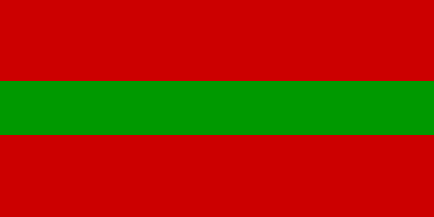
TRANSDNIESTRIA (PMR) |
Arrested in a Rebel Republic
TIRASPOL, TRANSDNIESTRIA I walked around Chisinau in the morning, and bumped into LT, the Danish journalist I met at Cricova. It was comparing our impressions of this beautiful country. He’s from Aarhus and told me about how that city’s famous bogman was regularly shoe-shined to make it look presentable.
At noon, I went to Chisinau's bus station to try catching a mini-bus (“mashut”) to Tiraspol, capital of the rebel Transdniestrian Moldavian Republic (Pridnyestrovskaya Moldavskaya Respublika or PMR in Russian). After a confusing 20 minute search for the bus, which includes an examination of documents by two late teenage soldiers who asked for my passport either for mere fun or bribes, or both (common in the FSU republics - but didn't pay them any), I finally found the right bus. The bus sped eastwards across the rolling hills of Moldova with their vineyards and endless sunflower plots.
Rural Moldova is a religious country. Crosses, statues of Christ and Virgin Mary, and other religious symbols stood at many a road corner, either to bless travellers, or to provide an express prayer, or even to warn those who drive too quickly – “you will see me sooner than you thought if you continue to speed”.
The journey was an interesting one, especially with the presence of
a elderly semi-drunken gentleman who shared his vodka, sweets and pizza,
and was lengthened by 15 minutes by a stop whereby everyone except me alighted
to buy water melons at roadside stalls. I don't fancy bringing water
melons around war zones. After 1 hour, it became clear that we were
beginning to enter the conflict zone, as we began to encounter army roadblocks
and occasional roadside graves for soldiers killed in the civil war in
1992. Then came the final Moldovan roadblock with huge warning signboards.
100 meters away was the border post of the PMR, with its red-green-red
flag - basically the flag of the old Moldavian Soviet Socialist Republic,
but minus the hammer and stickle.
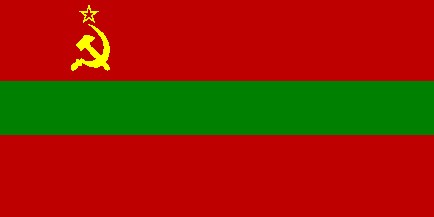 |
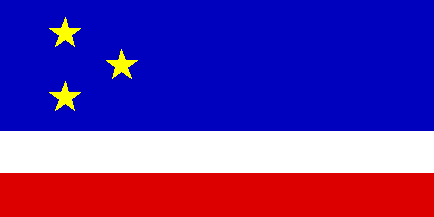 |
|
|
|
A sweeping glance at the border post, and I quickly drew the window curtains in case they notice a foreigner on the bus. The mini-bus stopped for less than a minute and then resumed its journey. Two further roadblocks 100 meters down and nothing awful happened. I am now in the PMR !
PMR declared independence from Moldova in 1990 when it became clear that the Moldovans wanted to leave the USSR. When the USSR collapsed in 1991, rebellion broke out and many died in this civil war that left the economies of both Moldova and mainly Russian- and Ukrainian-inhabited PMR in shambles. With the help of the Russian 14th Army under General Lebed, the Transdniestrians, led by their President, Igor Smirnov, defeated the Moldovans and achieved de facto independence, although this has never been recognised by anyone. The Transdniestrians kept their Soviet symbols, from the Moldavian SSR flag to the large flying saucer-shaped police hats, as they earnestly dream of the day when the USSR would be reinstated and the good old days –real and imaginery – would return. While Moldova is beginning to recover and receive international aid, PMR sank further and the average Transdniestrian’s income is, if he does have a job, US$10 to 15 per month. This compares with US$30 in Moldova.
The bus continued for another 1/2 hour to Tiraspol, the capital, passing
numerous road blocks where nobody gave a damn about my presence.
The PMR flag flew everywhere and Russian signboards reign, as opposed to
Romanian ones in Moldova proper. Lots of soldiers around - at almost
every street corner. Tanks and armoured carriers as well, plus sandbags
and mini-bastions or fortresses along the road to Tiraspol. The bus
also passed a few Russian army bases in Bendery, or Tighina in Romanian.
Bendery is Moldova’s 3rd largest city and lies on the right bank of the
Dniestr River. A great fortress first built by Stefan cel Mare, it
was subsequently fortified by the Turks and Russians due to its strategic
location. Although it is not traditionally considered part of Transdniestria,
it was occupied by the Transdniestrian nationalists and many battles were
fought here during the 1992 war. The bridge across the Dniestr River
is perhaps the one of the most militarily strategic points of Transdniestria,
and many soldiers are on the lookout here.
Finally we reached Tiraspol Bus Station, where the chap sitting beside me surprised me by speaking to me in broken English, asking where I was going - he had seen me reading Lonely Planet. Vladimir was an ethnic Ukrainian petroleum engineer previously working in Siberia. Moved here 7 years ago as this was his wife's hometown. He has no job now - common among more than half of PMR's population, though his daughter teaches English at a local school. His daughter, Nadia, has often dreamed of meeting foreigners - difficult in this isolated rebel state, and he wanted me to meet his daughter. It was difficult to find English-speakers in Moldova, especially in this rebel state, and so I jumped at the opportunity.
We walked through this small city - dirty and run-down compared even
to many ex-soviet states. This shouldn’t be surprising, for the state
is broke, and there is little economic activity except smuggling.
They issue their own stamps but have to affix Moldovan stamps in order
to get them posted out of this mini-state. They have their own PMR
Ruble, but inflation had rendered it more worthless than toilet paper -
at least toilet paper has some utility value. PMRR 1 million was worth
a dollar three months ago, and now it is PMRR 3.3 million to a dollar.
Belarus looks like an economic powerhouse compared to PMR ! Young
people cannot find jobs and university graduates have to work as hawkers
and waiters. The latter isn’t easy as well, as the lack of any economic
activity means few can afford to eat in restaurants. The internet
has reached PMR, but mainly due to the efforts of matchmaking agencies,
which put up on their websites pictures of PMR ladies looking for foreign
husbands.
Vladimir brought me to a dodgy looking apartment block with lots of rubbish around the lift lobby. He tried to comfort me by pointing to a similar looking building nearby – “President Smirnov lives there.” The lift door closed and I realized that there weren’t any lights in it, or rather, the lights were long gone and not replaced. Vladimir apologised profusely for the state of the building, while I uttered a silent prayer, hoping that I hadn’t met a local version of serial killer a la Rostov.
Nadia was glad to see me and postponed her appointments - she was about
to go out to interpret a letter. She then walked me around Tiraspol,
capital of PMR and second largest city of Moldova. This was obviously
a much more important place in the past. During the Soviet
days, Chisinau (or Kishinev, as it was known then) was the political capital
while Tiraspol-Bendery region was the economic engine of Moldavia.
The power stations were here. So were the factories and the national
radio station. Now Radio Moldova has to broadcast from Bucharest
instead.
But Tiraspol today is a city of abandoned buildings and half-built ones. The economy had collapsed. The only well kept buildings are state buildings and the Orthodox Church with its new shiny domes. The Orthodox metropolitan or bishop of PMR is also building for himself a huge new palace in downtown Tiraspol.
We passed an elaborate time capsule with a well-maintained (unusual in this country) plaque in ploshchad Constitutii (Constitution Park) where one sees a large statue of Tiraspol’s 19th century Russian founder, General Suvorov. The time capsule was placed there in 1967, on the 50th anniversary of the Russian Revolution, and city fathers plan to open it in 2017, the 100th anniversary of the Revolution. Since then, the Union has fallen, but never mind that, for the Transdniestrians believe that the USSR would rise again like phoenix. Dream on. If you want to visit a Soviet theme park, come here to Tiraspol.
We stopped at a money changer, and I got a wad of banknotes in exchange for a dollar. The biggest was 500,000 PMRR, which was worth 16 cents. The smallest was 10,000 PMRR and even that was originally an one ruble note, with the four zeros overprinted onto it. Well, it seemed that even the overprint wouldn’t work, as five of the renewed banknotes were now worth barely a cent.
The huge Presidential Building with the statue of Lenin stood nearby. A huge flag of PMR flew above. Web acquaintances have warned about taking photos here, but seeing no police around, I have decided to go ahead. Suddenly, a young man dressed in smart, well-ironed suit ran out and asked us to go into the building. It was forbidden to take photos here, he said, and we need to hand over the film. Nadia was embarrassed and pleaded with him - everything goes on in Russian. I pleaded innocent, of course, though enjoying the adventure. I also said rhetorical things that one says while toasting Russian style - like, I have heard about your beautiful city and your freedom-loving people, and wanted to visit, blah blah - all bullshit. I was asked to show my passport and they wrote my details onto their record book - which seems to have one or two entry everyday - all foreign pseudo-innocent offenders like me. Journalist, he asked ? No, I'm a banker, specialising in putting companies together. Maybe I will get an audience with the rebel president - try to privatise our companies or something. Or get a cut from their smuggling activities. Maybe the Bank of NY can teach me a thing or two.
Eventually, he let me go (and films intact as well). Nadia apologised
profusely to me. I felt really guilty although pretending to be an
innocent tourist. Then we returned to their house where they drove
me to the bus station, trying to catch a bus to the Gagauz Autonomous Republic
- another part of Moldova which tried to breakaway but eventually chose
to stay, and given autonomy as a result. However, the timing given
to me earlier was wrong, and the last bus had already left. I could
only return to Chisinau.
This was a bigger bus and I sat at the back. Just behind me were two ladies who wore rather scantily and behaving intimately with each other - hugging and kissing throughout the two-hour bus ride. This only stopped when the bus reached the ceasefire post, where they quickly put on jackets and sat straight. Moldova might have abolished anti-homosexuality laws (per Lonely Planet) but obviously PMR retains everything that represents the USSR. They have a reason to be discreet now.
A PMR officer came on board and I tried to turn aside, pretending to sleep. He walked past me and guess what, nothing happened. Nobody checked my passport on this trip ! And that's the end of my adventure to Transdniestria/PMR
As the bus entered Moldovan-controlled territory, I turned back, looking
at that green-red flag of PMR, now wet after a brief rain and sticking
tightly to the flagpole like a dirty rag. I wonder how long this
mini-state will last. The Transdniestrians were hoping for the resurrection
of the USSR, a long dead and decomposed messiah. Signs of betrayal
by the Russians are already emerging – the Russians withdrew tonnes of
ammunition from Transdniestria without the latter’s knowledge, a month
after I left. Will the Russians continue to subsidise a worthless
sliver of land not even territorially linked to Russia proper ? When will
the 14th Army leave, and can PMR survive on their own ? Unfortunately,
in the world of geopolitics, tiny communities such as the PMR are mere
pawns in a great game beyond their control.
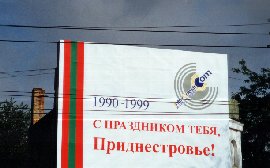 |
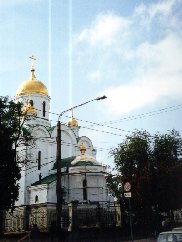 |
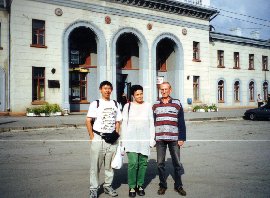 |
|
|
|
|
The Disappointed Traveller
I returned to Chisinau to find that I have unfortunately also missed the last bus from the capital to Comrat, capital of Gagauzia. Felt quite sad at missing the opportuntiy to stay at a Gagauz home. I rang my Gagauz friend to apologise. No bus to remote Comrat until the following morning, but I have to set off for Kiev in the afternoon. Felt very disappointed at failing myself and friends, especially knowing the legendary hospitality of the Turkish/Turkic peoples.
To comfort myself (lame excuse), I had dinner at the city's most expensive restaurant – Stari Gorod, or Old City. I arrived there seeing a whole corp of personal bodyguards and chauffeurs, all dressed in formal suits and ties, waiting for their esteemed masters who were dining inside. The Lonely Planet says ministers, top businessmen and the who’s who of Moldova dine here. Seeing the intimidating crowd, I almost left immediately, only to be called back by a restaurant staff standing at the entrance. I had thought the place was booked in its entirety by some mafia chiefs. Not so, but probably a handful of mafias were in – which was probably true – ministers, businessmen and mafia – were they all the same ?
Embarrassingly, I was the only diner in casuals. But it was certainly an enjoyable Moldovan meal - Moldovan/Romanian cuisine is sophisticated compared to Ukrainian or Baltic cuisines and the meal cost only US$10 with tips. The waiters dressed in tuxedos and they light candles at your table. They speak English too. I asked the tall handsome bloke serving me where he learnt to speak such good English. Mistake, Round 2. “I’m from Odessa, a graduate of Chisinau University. But now I’m stuck here, and I need to work.” His voice trembled with emotions, and then he sighed.
Me and my talkative mouth. My insensitive, over-inquisitive words must have pierced his heart. Again, such waste of talent. The economic collapse of these nations has robbed many of their pride and dignity…
| RETURN TO FROM THE BALTIC TO THE BLACK SEA HOMEPAGE |